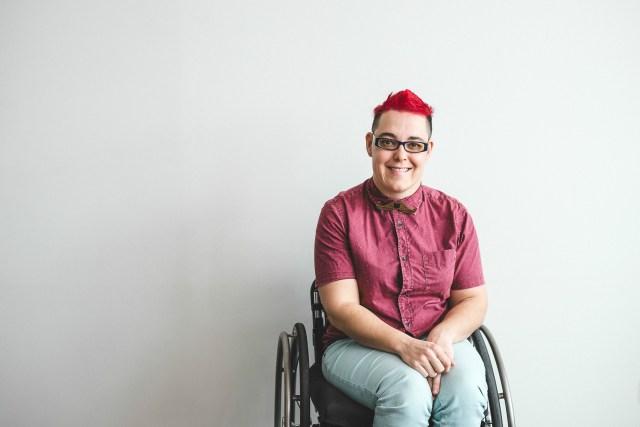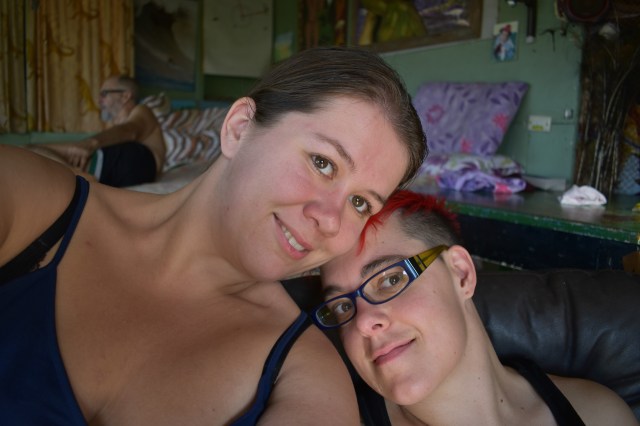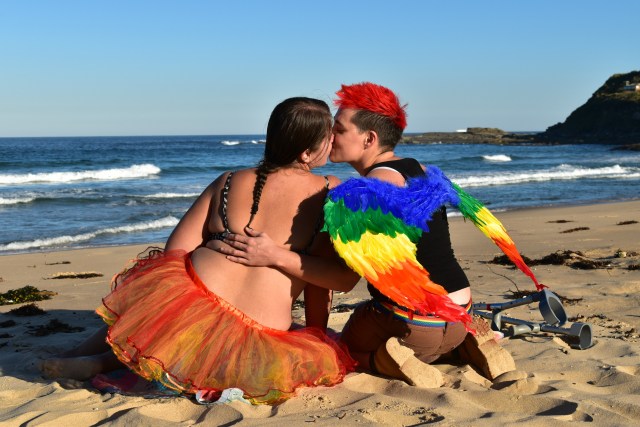On Sunday night, my girlfriend and I were at the airport (my favorite!) when a security guard asked us to clarify ourselves.
“Are you two related?”
“No, girlfriends.”
“Okay, so you guys are friends.”
“No, girlfriends. Like —”
Before I could confirm that she meant “dating each other,” he was already down the jetway, explaining to his colleague that “she’s traveling with her friend.”
Tale as old as time, really — especially for queer women. And if you add disability into the mix, you wind up with a dynamic that a surprisingly large number of people flat out fail to understand. That’s why I was excited to talk to Jax Jacki Brown, a queer crip activist, performer, writer, feminist, public speaker on LGBTQIA and disability rights, person I have long admired from across the internet, and proud co-owner of one of the sweetest and gayest relationship stories I’ve heard.

Photo by Breeana Dunbar
She had this to say about her girlfriend, Anne:
“We’ve been together for two and a half years, so of course we U-Hauled pretty quick and we have a cat. She’s a non-crip, but she’s an awesome ally. She’s read all the disability studies texts I own (which is a lot!). We talk about disability and queer rights, and she deeply engages. She gets it as much as someone who isn’t a crip can. Allyship is really core to our relationship. We spent 10 of our first 11 days together, and in true lightning-fast lesbian fashion, we’ve been together ever since.”
Enjoy our conversation on disability pride, how a wheelchair can be like a lover, and proof that poetry really does get you the babes.
Tell me more about your girlfriend!
Her name’s Anne and we officially met online, on a queer dating website. But she had seen me perform poetry at a local queer venue a few months previous to me cruising her there. She says she thought I was super cute and funny with my queer crip poetry, but apparently during the break when she was trying to summon up the courage to come say hello, I had a bunch of people around me (it was my local queer venue so I knew people) and she thought “there’s no way she would be single.” So when she saw me online and I inboxed her she was like “oh, it’s the babe from poetry.” So yeah — poetry can get you the babes!
We talked for like a week online, then she got really drunk one night and sent me her number and we had a cute phone chat, then we went on a date and really haven’t looked back since! To be honest, in true queer form, we basically spent all of our time together from the start, but we did wait almost a year before I moved in with her and her cat. And that was almost three years ago now!

She is a proud fat, femme feminist. She is generous, kind, witty as hell (she loves a good pun), sexy and just easy to love. My queer relationships prior to this one have always been high drama, so it took some getting used to being in a relationship that just worked.
Now we live in the suburbs in Melbourne, Australia, with our cat, Boo, in an old rundown house that we are trying to fix up. It sounds super normcore and boring, but it’s not; we make it radical! It’s just super lovely. It’s my safe space, my home, and she is my space to land when I’ve been out in the world doing scary, boundary-pushing queer crip activist work.
Was she familiar with disability politics before meeting you, or did you introduce her to it? How’d you go about that if it was new to her?
This is a great question! So if I’m being honest, it took me awhile to talk to her about the social model of disability, which she didn’t know about before we started dating, and the reason it took me a while — whereas normally it’s one of the first things I talk about when I’m getting to know people as friends or lovers — is precisely because I really liked her. So it meant a lot to me that she understood how important my disability politics are and what my politics are, and I guess because I was already invested, there was a lot riding on “the conversation.” It took me a good couple of months to tell her about the social model and disability rights, even though she used to ask me about it. I mean, she knew that I was speaking at things and vaguely what it was about, but that was it.
“It’s knowing that she has my back — that not only does she get it, she will fight for it, she will fight with me. She loves me just as I am.”
Part of my reluctance and fear around “the conversation” had to do with my parents’ ableism. I feared having someone I really liked dismiss me in the same way they have. I mean, logically I knew she wouldn’t, because she has a deep understanding of power, identity and social justice. But that’s the effect of ableism — the fear was still there.
When we did finally talk about it, she said something like “I’ve never heard of the social model, but of course the world and society influences how you experience your body and interactions and places.”
Was there a moment where you knew that she really “got it” and that you were safe and understood, or did it evolve over time?
It’s a combination of all the moments where something ableist happens where she is there giving me that look that says “I’m here, I’m seeing it too, you’re not alone.” It’s in those moments after something ableist happens and we come home and I debrief with her, and she is able to articulate clearly and with rage why what happened was fucked.
One example, which I’ve written about before, is when we were at a dinner party and people started talking about how of course you would abort disabled fetuses. People were agreeing as though it was the only logical option, and then my friend finally turned to me and asked what I thought. So I tried to articulate why what was being said was deeply ableist and hurtful, and Anne clearly and calmly added to my points so I wasn’t the only voice in that room holding the weight of speaking up. Then we came home, she lay in bed and held me while we talked about what happened and asked what she could have done better, how she could have been there for me more in the moment, even though it was already beautiful not to feel lonely and isolated in those moments of speaking back to ableism.
The other example that springs to mind was last year when we went home to see my parents. They said a bunch of ableist things, and when I just couldn’t be in the room with them anymore — I just couldn’t continue to clearly and calmly explain why my disability is not a tragedy — she stayed and tried to talk to them and help them through the grief they are still resolutely stuck in. Then she came and held me and reassured me that the way that I think about my body, my identity, and my politics is valid.
It’s knowing that she has my back — that not only does she get it, she will fight for it, she will fight with me. She loves me just as I am.
“There’s this assumption that even if you’re calling each other ‘love’ and ‘honey’ and holding hands and behaving as a couple that of course you can’t really be lovers or partners — you must be friends or family, because a person with a disability can’t have a sexuality, let alone a queer sexuality.”
I love that allyship in all directions is core to your relationship. Can you tell me more about what that looks like?
To be honest, I think that she does a lot more ally work in the relationship than I do, but maybe that’s because ableism is more overtly present and unless publicly talked about than other forms of oppression. I think I am a good ally to her femme identity, but I could perhaps do better with allyship around fatphobia. I feel like our queer feminist politics are pretty aligned, and we back each other up and go on cute feminist dates to feminist events.
Do you deal with a lot of misconceptions as a mixed-ability couple?
People somehow assume that she’s amazing just for being with me, that she contributes far more than I that I do to the relationship, that she must earn more than I do, that I should be forever grateful, that one day she will wake up and realize that she is with a person with a disability (like somehow she hasn’t noticed) and leave me for someone “better” — and of course that person is an able-bodied person. Oh, and we get the comment all the time “you two look like sisters!” to which we’ve started saying “yeah, sexy sisters!”
You know, there’s this assumption that even if you’re calling each other “love” and “honey” and holding hands and behaving as a couple that of course you can’t really be lovers or partners — you must be friends or family, because a person with a disability can’t have a sexuality, let alone a queer sexuality.
I mean, you know all the stuff. I’m sure you and your girlfriend get it too.
Yup. Can confirm.
“She says ‘I like how you have a sound, that’s different from how everyone else sounds. I like that I can hear you coming home, wheeling up the ramp, moving about the house, and know it is you.'”
I’m really interested in your relationship to your wheelchair, and how that factors into your relationship with Anne. Can you tell me more about that?
I love my chair; it’s a part of me, it’s a part of my identity, it’s a part of my personal space. It’s how I move through the world, it’s how I am perceived, it’s almost an extension of me. It’s not just an object; it’s almost like a lover. I wrote a poem about it around five years ago called “Do you have sex in your wheelchair?”
To be honest, I’m tired of my current chair — she is getting old and I really need a new one, but the process in Australia is so arduous and long that I always put it off until they literally start falling apart.
Anne is always very respectful of my chair; she’s careful when taking the wheels off, putting it into cars, or carrying it upstairs to be kind and gentle, because she knows how much it means to me, and also that I only have one, so it’s precious. She says “I like how you have a sound, that’s different from how everyone else sounds. I like that I can hear you coming home, wheeling up the ramp, moving about the house, and know it is you. It is familiar and beautiful. I like how you move in your chair, and how your body has a rhythm and sway to it that is just yours.”
What has the process of cultivating disability pride been like for you?
I’m sure you’re familiar with Laura Hershey’s poem “You Get Proud by Practicing,” where she says:
Remember, you weren’t the one
Who made you ashamed,
But you are the one
Who can make you proud.
Just practice,
Practice until you get proud, and once you are proud,
Keep practicing so you won’t forget.You get proud
By practicing.
I think it is so true — practicing your pride in a society that tells you that you should be ashamed is an act of resistance and resilience. As the late and great Stella Young said, “This is possibly the most important thing anyone will ever tell you. The journey towards disability pride is long, and hard, and you have to practice every single day.” So I make sure I practice and surround myself with people who value and love me. I’m also profoundly lucky to do work in disability rights, and get paid for most of it these days.
Being queer and disabled has allowed me to live life outside the box of social expectations. It’s enabled me to deeply question society, bodies, power, identity, and to work out what I really think is important to value, what I’m really passionate about, what I believe in. It’s enabled me to become unapologetic and proud.
I try and proudly practice calling my body home, to truly inhabit my body, to feel what it feels like to live inside these muscles that bend and curl, and to feel proud of it, and no longer ashamed. This is queer crip pride.

Photo by Eddie Raft
So with all that in mind, what does love mean to you?
To me it means being seen, being truly seen — and loved — for all that I am. I think because of the effects of ableism I had been really damaged about what love could look like. The love I had experienced in the past had always been conditional and never a constant, but could always disappear without warning and be withdrawn at any time. The love I get from family has been tinged with their grief about my disability, and so it was never inclusive of it in a truly accepting and positive way. Love should push you to the edges of yourself and give you courage to go to those edges, to do the things that expand you and make you grow — but it should also give you a soft space to land, a sense of comfort and belonging and acceptance. It should call you home.

This was so beautiful. I learn so much from these columns, including about myself. Thanks Carrie and Jax!
Bloody lovely!
Oh. My. Lord. Almighty.
Please can every article have this level of depth and authenticity? These are the conversations we need to be having!
PS – super wishing I could have playdates with you fun gorgeous peeps?
Great to meet you Jax, I feel that I’ve had that privilege now. Fantastic read too Carrie. Thank You both for giving me an opportunity to hear your voices.
This column always gives me hope. Single queer crip feeling like the world has more than enough variations for me to someday find a human that can see and love me. Thank you!
Thank you for sharing!
I love this so much. It gives me hope ❤
These are my favorite Autostraddle articles. I love Queer Crip Love Fest. This was beautiful. The picture with the rainbow wings is everything.
This article has been open in my browser forever and I’m so glad to have finally read it! This filled my heart with love and warmth. Thank you for sharing :)